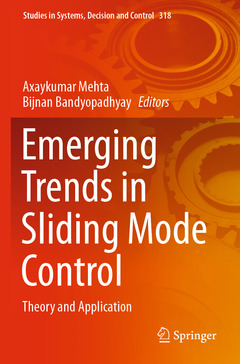Description
Emerging Trends in Sliding Mode Control, 1st ed. 2021
Theory and Application
Studies in Systems, Decision and Control Series, Vol. 318
Language: English
Subject for Emerging Trends in Sliding Mode Control:
Emerging Trends in Sliding Mode Control
Publication date: 12-2021
417 p. · 15.5x23.5 cm · Paperback
Publication date: 12-2021
417 p. · 15.5x23.5 cm · Paperback
Emerging Trends in Sliding Mode Control
Publication date: 12-2020
417 p. · 15.5x23.5 cm · Hardback
Publication date: 12-2020
417 p. · 15.5x23.5 cm · Hardback
Description
/li>Contents
/li>Biography
/li>Comment
/li>
This book compiles recent developments on sliding mode control theory and its applications. Each chapter presented in the book proposes new dimension in the sliding mode control theory such as higher order sliding mode control, event triggered sliding mode control, networked control, higher order discrete-time sliding mode control and sliding mode control for multi-agent systems. Special emphasis has been given to practical solutions to design involving new types of sliding mode control. This book is a reference guide for graduate students and researchers working in the domain for designing sliding mode controllers. The book is also useful to professional engineers working in the field to design robust controllers for various applications.
Homogeneous Sliding Modes in Noisy Environments.- A Lyapunov based Saturated Super-Twisting Algorithm.- Sliding Mode Control-Based Tracking of Non-Differentiable Reference Functions.- State Boundedness in Discrete-Time Sliding Mode Control.- Discrete Stochastic Sliding Mode with Functional Observation.- Design of Event-Triggered Integral Sliding Mode Controller for Systems with Matched and Unmatched Uncertainty.- Design of Periodic Event-Triggered Sliding Mode Control.- Sliding Modes in Consensus Control.- On Fixed-time Convergent Sliding Mode Control Design and Applications.- Discrete Higher-order Sliding Mode Leader-Following Consensus Protocols for Homogeneous Discrete Multi-Agent System.
Axaykumar Mehta received his Bachelor of Engineering in Electrical Engineering (1996), M.Techin Control Systems (2002) and Ph.D. (2009) degrees from Gujarat University, Ahmedabad, Indian Institute of Technology Kharagpur, and Indian Institute of Technology Bombay, respectively. He is currently associated as an Associate Professor in Electrical Engineering at the Institute of Infrastructure Technology Research and Management, Ahmedabad, Gujarat. Prior to that, he was Director of Gujarat Power Engineering and Research Institute, Gujarat. He has more than 22 years of teaching experience at the undergraduate and graduate levels at various premier institutions of Gujarat. He has supervised 5 PhD thesis in the domain of sliding mode control and published more than 80 research articles and book chapters in reputed journals, conference proceedings, and books. He has also authored 4 monographs on sliding mode control and edited 3 proceedings with Springer Nature Singapore. He has also published 5 patents at the Indian Patent Office Mumbai. He has successfully organized International Conference on Power Control and Communication 2019 supported by Springer India. He is also an advisor to Gujarat Council on Science and Technology, Government of Gujaratfor the Design Lab project and Robotics Museum. His research interests include networked sliding mode control, control of multi-agent systems and its applications. Dr. Mehta received the Pedagogical Innovation Award from Gujarat Technological University (GTU) in 2014, and Dewang Mehta National Education Award in 2018.He is a senior member of the IEEE, member of the IEEE Industrial Electronics Society (IES) and Control System Society (CSS), life member of the Indian Society for Technical Education (ISTE), and Institute of Engineers India (IEI).
Professor BijnanBandyopadhyay received his B.E. degree in Electronics and Telecommunication Engineering from Indian Institute of Engineering
Compiles recent developments on sliding mode control theory and its applications
Presents practical solutions to design involving new types of sliding mode control
Serves as a reference guide for graduate students and researchers
© 2024 LAVOISIER S.A.S.

